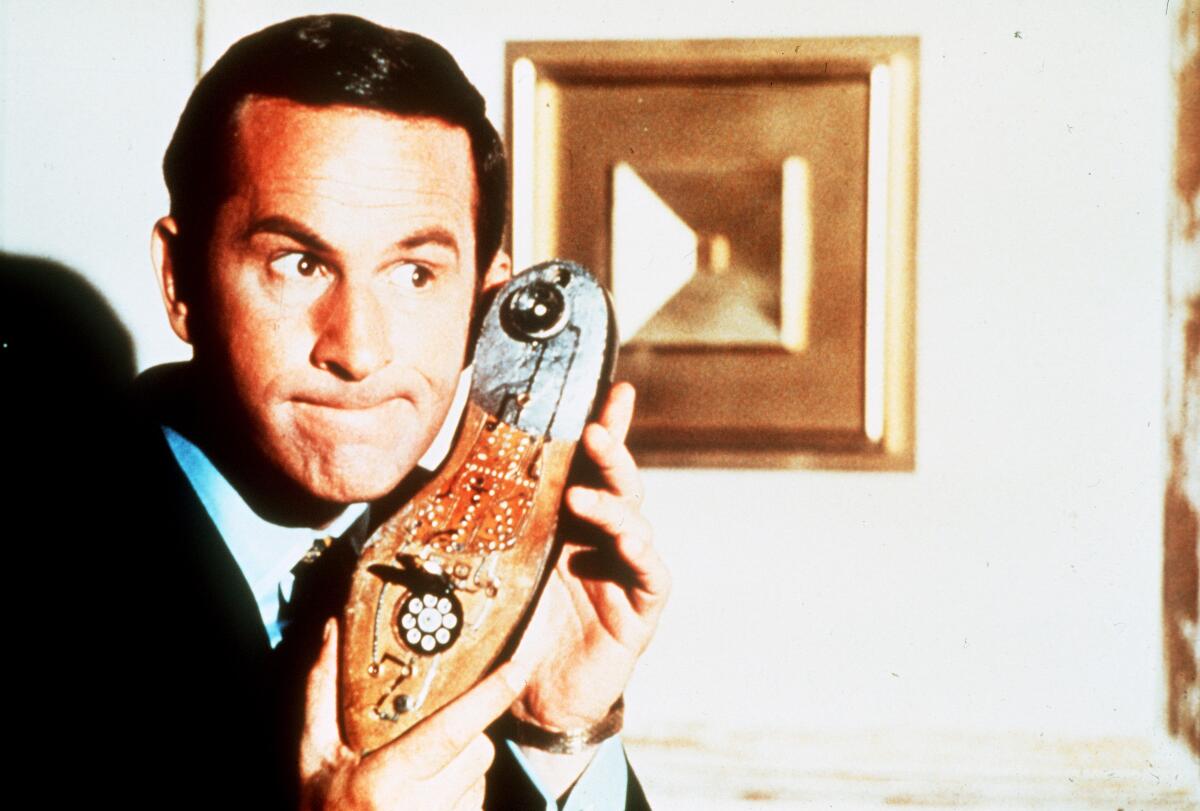From the Archives: Viewers ‘Get Smarter’ with breakthrough in hip satire

- Share via
It has long been the theory of Madison Avenue aristocracy that the groundlings in televisionland won’t accept anything more creatively stimulating than “Petticoat Junction” or “The Flintstones”.
Unfortunately, the ratings have supported this philosophy for a disturbing number of seasons — until now. Admittedly, cornbelt comedy and serialized tragedy still have the edge, but there is pleasing evidence that some hip satire is closing in.
This is clearly indicated in the success of NBC’s “Get Smart,” which has surpassed an imposing list of perennial rating grabbers and appears to be the hit of the new season. Don’t whisper this around the tea rooms, but “Get Smart” has even out-rated Lawrence Welk, which is like telling your grandmother that Fabian just beat up Nelson Eddy.
Mel Brooks is to comedy what Sandy Koufax is to the Dodgers.
What is responsible for this sudden, amazing change in American tastes? How does one explain the sociological ramifications involved? Why is clever satire threatening apple pie and Ed Sullivan? For the answer to these and other pressing questions, we went directly to the source — to the smart behind “Get Smart” — Mel Brooks, its creator.
Touch of Irony
Mel Brooks is to comedy what Sandy Koufax is to the Dodgers. He has originated more ways to put the message across than any of his contemporaries.
Brooks’ story began with a classic touch of irony. The last time he was a contributing writer on a comedy show, he labored lovingly for Sid Caesar’s weekly hour. After a substantial run, Caesar was bounced by Lawrence Welk. When something of this nature occurs, one doesn’t recover quickly.
Between Caesar and “Get Smart,” Brooks enjoyed a flourishing comedy career as a performer on television and record albums (his albums with Carl Reiner, featuring the “2,000-Year-Old Man,” are bestsellers). He was understandably reluctant to return as a TV author until Talent Associates approached him with a carte blanche contract.
Sponsors Eager
“I didn’t want to do a dopey, dumbo thing,” he said, “no sermonettes, no maid running the household. Talent Associates gave me the chance to capitalize on the James Bond syndrome, but with straight spoofing.”
With no restrictions, no pressure, Brooks and his writer-pal, Buck Henry, spent 4 1/2 months developing the pilot for “Get Smart.” NBC acquired it (ABC turned it down cold), everybody agreed on Don Adams as the star (Maxwell Smart) and sponsors came aboard eagerly. Brooks couldn’t believe his luck.
“NBC has been great,” he said with delighted surprise, “they haven’t been networky. Even the sponsors are very good about it. It’s a conspiracy of hipness and goodness. I don’t understand it.”
Initially, Brooks and Henry had to find a twist on the stereotyped James Bond satire. So they made Bond (in this instance, Maxwell Smart) the goof, the foul up. Next, they incorporated a good storyline, a certain amount of tension and a trajectory of adventure. Then, they combined it with the thing they do best — satire.
Answer Basic
“But we were really satisfying our own tastes. Could we then satisfy everybody, reach the little towns? The answer was basic. ‘Funny’ is the common denominator. It had to be funny, with enough visual slapstick so families would dig it. It came down to the W. C. Fields premise: ‘Be funny, be literate, touch all bases and leave no one out.’”
A monumental task, but mission accomplished. A true breakthrough in television creativity, to be sure.
“Buck Henry and I supervise all story material and together we write enough of the scripts. It’ll never be ‘Petticoat Junction,’ I never want to do that. If I ever did, I’d go out and put a bullet in my foot-wing myself.”
Mel Brooks is best known for his performing art. Within show business circles, he is referred to as the hippy’s hippy. As is the case with “Get Smart,” Brooks employs a brand of comedy that appeals to everyone. What, then, is most satisfying to Brooks?
“Put it this way,” he said, “I’d rather perform than write for ‘Gilligan’s Island,’ but I’d rather write than perform in ‘Petticoat Junction.’ Basically, I’m a writer. Performing is like an affair, writing is like a marriage.”
Brooks’ albums with Reiner are spectacular — knockouts in ad-lib comedy. Will he continue to do them?
“No, no more albums. We’ll do the act on television, that’s all. I served my purpose in the albums. I did them because I wanted to do something for ethnic comedy. In 50 years I don’t think there will be a Jewish accent. I wanted to leave something, because I’m spectacularly Jewish.”
Mel Brooks may leave something else, equally important. He may have proved that the groundlings can be stimulated by something more intellectually stimulating than “Petticoat Junction.”


